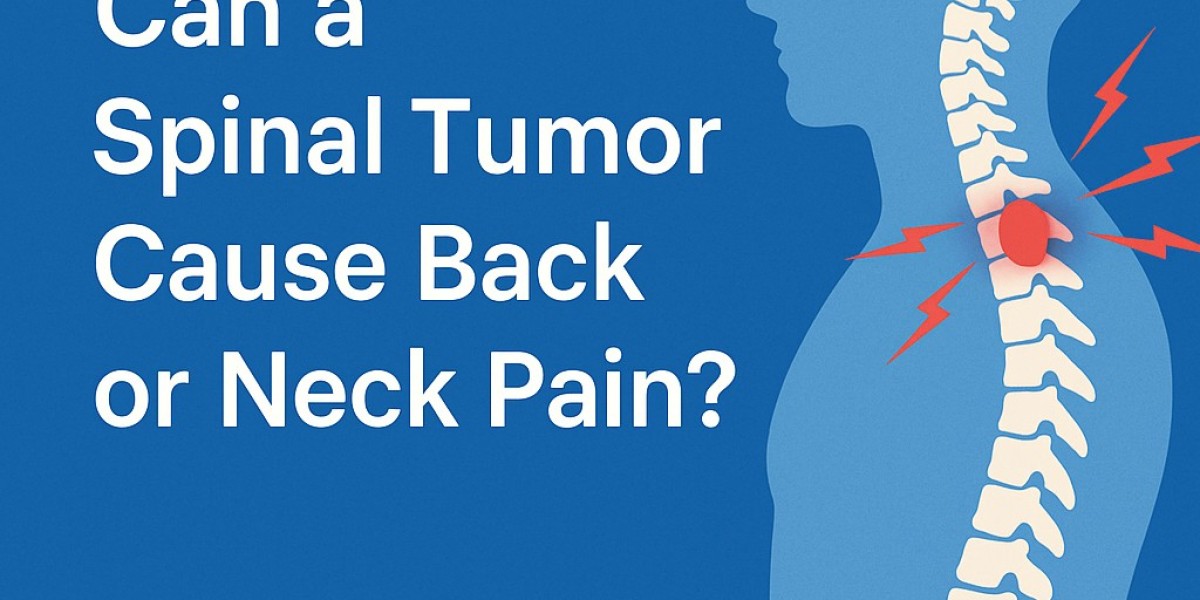Back and neck pain are among the most common complaints people experience, often caused by muscle strain, herniated discs, or poor posture. However, in some cases, persistent or severe pain may signal a more serious underlying condition—such as a spinal tumor.
If you're dealing with ongoing back or neck pain and wondering whether a tumor might be the cause, it's important to understand the signs, symptoms, and available diagnostic and treatment options.
In this blog, we’ll explore whether a spinal tumor can cause pain, what symptoms to watch for, and when to seek help.
Understanding Spinal Tumors
A spinal tumor is an abnormal growth of cells within or near the spinal cord and spinal column. These tumors can be benign (non-cancerous) or malignant (cancerous) and may originate in the spine (primary tumor) or spread from another part of the body (metastatic tumor).
Depending on their location, spinal tumors can press on the spinal cord, nerves, and surrounding tissues—causing a variety of symptoms, including pain in the back or neck.
Can a Tumor Cause Neck or Back Pain?
Yes. One of the earliest and most common symptoms of a spinal tumor is persistent back or neck pain. This pain is often different from typical muscular pain because it:
Worsens at night or while resting
Doesn’t improve with conventional treatments like rest, massage, or medication
Progressively gets worse over time
May be accompanied by other neurological symptoms
Key Facts:
Spinal tumor symptoms and back pain are closely linked because tumors can press against spinal nerves or the spinal cord itself.
Tumors in the cervical spine (neck area) often cause neck pain, along with arm weakness or numbness.
Tumors in the thoracic or lumbar spine typically cause upper or lower back pain and may lead to symptoms in the legs.
Common Signs of a Spinal Cord Tumor
Recognizing the early warning signs of a spinal tumor is critical for prompt diagnosis and treatment. Here are the most common symptoms:
1. Chronic Back or Neck Pain
Doesn’t respond to physical therapy or over-the-counter medications
May feel deep, aching, or sharp
2. Numbness or Tingling
In the arms, legs, or chest
Often a sign that the tumor is pressing on spinal nerves
3. Muscle Weakness
Especially in the legs or arms
Can lead to coordination problems or difficulty walking
4. Loss of Sensation
In the hands, feet, or other parts of the body
5. Changes in Bladder or Bowel Function
Incontinence or difficulty urinating may indicate spinal cord compression
If you're experiencing any of these signs of a spinal cord tumor, especially alongside neck or back pain, it’s crucial to consult a specialist.
How Spinal Tumors Are Diagnosed
At Texas Spine and Pain, we offer advanced spinal tumor diagnosis in Plano, Texas, using a combination of imaging and neurological testing. Here’s what you can expect:
1. Physical and Neurological Exam
Evaluates reflexes, muscle strength, coordination, and sensory response
2. MRI or CT Scan
Provides detailed imaging of the spine to detect abnormalities
MRI is especially useful for identifying tumors within the spinal cord
3. Biopsy
If a tumor is found, a biopsy may be required to determine whether it is benign or malignant
Early diagnosis is key to managing spinal tumors effectively and preventing permanent damage.
Expert Care from a Spinal Tumor Specialist in Plano, TX
At Texas Spine and Pain, our board-certified physicians are experienced in diagnosing and treating spinal tumors with the utmost care and precision. Whether your symptoms are mild or severe, our team develops a customized treatment plan that may include:
Medication management for pain and inflammation
Physical therapy to restore mobility and strength
Spinal injections for targeted pain relief
Referral for surgical consultation, if necessary
We understand that every case is unique, which is why we take a comprehensive and patient-centered approach to pain management.
When to See a Neck and Back Pain Doctor in Plano
If your back or neck pain is persistent, worsening, or accompanied by neurological symptoms, don’t delay seeking care. Our neck and back pain doctors in Plano specialize in uncovering the root cause of your pain and providing relief.
Symptoms that require urgent evaluation include:
Pain that wakes you at night
Muscle weakness
Unexplained weight loss
Loss of bladder or bowel control
Why Choose Texas Spine and Pain?
We are proud to serve the Plano, Texas community with compassionate, expert care for a wide range of spinal conditions. Here’s why patients trust us:
✅ Board-Certified Specialists
✅ Advanced Diagnostic Tools
✅ Non-Surgical & Interventional Treatments
✅ Personalized Care Plans
✅ Focus on Restoring Quality of Life
From spinal tumor diagnosis to comprehensive neck and back pain treatment, our team is here to support you every step of the way.
Take the First Step Toward Relief
Don’t ignore persistent neck or back pain—it could be more than just strain. At Texas Spine and Pain, we’re here to help you find answers and relief.
✅ Schedule your consultation today:
? Contact Us
? Book an Appointment
Let us provide the personalized care you deserve.
5 FAQs About Spinal Tumors and Pain
1. Can a spinal tumor be the only cause of back pain?
No, most back pain is due to common issues like disc degeneration or strain. However, if pain is persistent and accompanied by other symptoms, a spinal tumor should be considered.
2. How do I know if my neck pain is from a tumor?
If neck pain is chronic, worsening, or occurs with tingling, weakness, or trouble walking, it’s important to get evaluated for a possible spinal tumor.
3. Are spinal tumors always cancerous?
No. Many spinal tumors are benign, but even non-cancerous tumors can cause serious symptoms if they compress nerves or the spinal cord.
4. How are spinal tumors treated?
Treatment depends on the tumor type and location. Options include observation, medication, physical therapy, spinal injections, or surgery.
5. Is early diagnosis important for spinal tumors?
Yes. Prompt diagnosis and treatment can prevent permanent nerve damage and improve outcomes significantly.
Disclaimer
This blog post is for informational purposes only and is not a substitute for professional medical advice, diagnosis, or treatment. Always consult with a qualified healthcare provider regarding any medical condition or concerns you may have.








